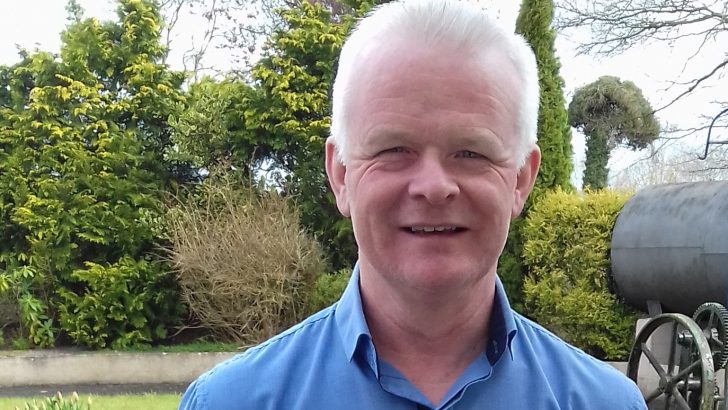Fr Cathal Deery was born in Monaghan town, and had a traditional Catholic upbringing, where the family rosary was a daily occurrence. “It was part of growing up,” he says, adding, “going to Mass wasn’t an option – we’d go every Sunday.” His maternal grandfather had a strong influence on his faith, which compelled him to become involved in the local parish. His faith stayed with him throughout his education and he was eventually ordained a priest and now works as a curate in Clones, Co. Monaghan.
Although he felt called to become a priest, Fr Cathal is still unsure as to whether it was the correct path to take, saying, “I’ll never be sure whether this is for me”. Continuing, he says, “I certainly grapple with my faith…I still struggle.” Despite the uncertainty, he is sure of God’s presence in his life, deep in “the midst of it”.
One of the main realisations that Fr Cathal had from being in the priesthood for so long in Ireland is that “the Faith and the institution are quite different”. Disillusioned by the institutional Church, and in particular, its failure to respond properly to the abuse scandals, Fr Cathal says that the “Church in Ireland will never recover – nor should it.” He adds that, “we are not grappling with the issues that we should be…we talk around the issue.” For him, the leadership in the Church is fragile, because we “don’t hear too many prophetic voices”.
Rather than ignoring issues for self-preservation, he feels the people in the Church should “shout from the rooftops” about these contentious issues. These nega-tive aspects, however, have not overshadowed his experience in the Church, which he sees as being fruitful, especially through the provision of education and healthcare.
One of the most important problems that Fr Cathal is passionate about alleviating in parishes today, are mental health issues among the laity and the clergy, resulting in him becoming the Diocese of Clogher’s designated priest on suicide and suicide prevention. He recently became involved in an initiative called ‘Flourish!’, in association with Lighthouse Ireland, which is aimed at the four main Christian Churches across Northern Ireland in helping to improve the mental health of the clergy, and promote emotional well-being.
Straining
From personal experience, Fr Cathal is aware that being a priest can be emotionally and physically straining, and so the “clergy should be supported by Church leadership” and the leadership in turn “needs to be supported”, he says. This support is especially needed in the priesthood because “the issue of celibacy has created loneliness”, he says, adding, “there’s a great sense of isolation because we’re not married”. This in turn means that less people decide to join the priesthood and so, “the demands of ministry can create an overwhelming feeling”.
Another reason as to why mental health issues can manifest among the clergy is that those in spiritually authoritative positions are “reluctant to let people know that [they] are struggling” he says, adding that “a lot of priests think that they have to reach peoples’ expectations and so they don’t let their guard down”.
Fr Cathal believes that all clergy should be “open to receiving help” and need “to know their limits”, through prayer, reflection, positive affirmations, as well as eating and resting properly. The new resource ‘Flourish!’ works as a self-care toolkit for the clergy to get informed about how to lead a mentally healthy ministry, and will hopefully be distributed throughout all of Ireland in the future.
The toolkit also offers a range of training courses as practical support to help Churches respond to vulnerable people.
On average, over 800 people die annually by suicide on the island of Ireland, affecting thousands of people in their communities. “To me, this is a crisis,” says Fr Cathal, continuing, “the government and politicians need to do more…it’s a bread and butter issue”.
In religious circles, Fr Cathal believes many priests are not trained sufficiently enough to support families suffering with bereavements from suicide. Often, they will reflect on questions such as, “How do I as a priest address suicide and my own fear? How do I celebrate the funeral? How can I be as sensitive as possible?”.
Answers to these questions are vital for Fr Cathal, because “the clergy are at the heart of communities – people value our presence and our contribution”. The clergy are able to provide a non-judgemental space of dialogue for people who come to them, and this type of presence can be “invaluable” he says.
Distressing issues
Fr Cathal also affirmed that spirituality can help people cope with these distressing issues, adding that faith has sustained him during dark times in his life. On September 30, a special event called ‘Living with Suicide Day’, will take place in Lough Derg supporting anyone affected by suicide, bereaved by suicide, working in the area of suicide awareness and prevention, those working in schools, clergy working in parishes, or those in emergency medicine.
Fr Cathal’s parting message is “Don’t ever underestimate what you might be able to do and what you are doing”.
For copies of the Flourish! toolkit and for further information visit www.wewillflourish.com


 Colm Fitzpatrick
Colm Fitzpatrick Fr Cathal Deery.
Fr Cathal Deery. 